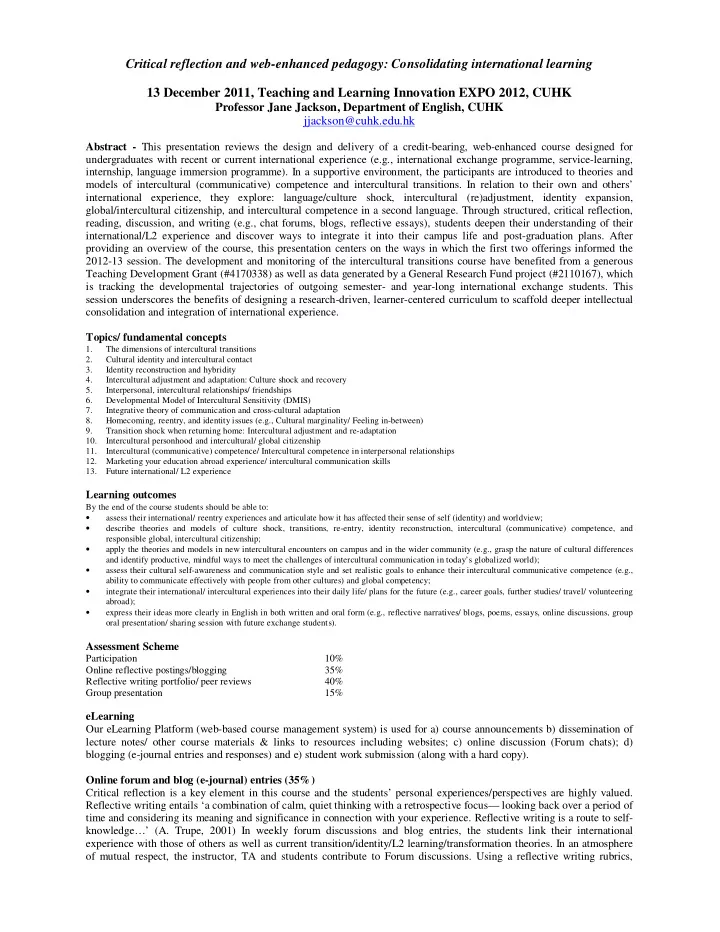

Critical reflection and web-enhanced pedagogy: Consolidating international learning 13 December 2011, Teaching and Learning Innovation EXPO 2012, CUHK Professor Jane Jackson, Department of English, CUHK jjackson@cuhk.edu.hk Abstract - This presentation reviews the design and delivery of a credit-bearing, web-enhanced course designed for undergraduates with recent or current international experience (e.g., international exchange programme, service-learning, internship, language immersion programme). In a supportive environment, the participants are introduced to theories and models of intercultural (communicative) competence and intercultural transitions. In relation to their own and others’ international experience, they explore: language/culture shock, intercultural (re)adjustment, identity expansion, global/intercultural citizenship, and intercultural competence in a second language. Through structured, critical reflection, reading, discussion, and writing (e.g., chat forums, blogs, reflective essays), students deepen their understanding of their international/L2 experience and discover ways to integrate it into their campus life and post-graduation plans. After providing an overview of the course, this presentation centers on the ways in which the first two offerings informed the 2012-13 session. The development and monitoring of the intercultural transitions course have benefited from a generous Teaching Development Grant (#4170338) as well as data generated by a General Research Fund project (#2110167), which is tracking the developmental trajectories of outgoing semester- and year-long international exchange students. This session underscores the benefits of designing a research-driven, learner-centered curriculum to scaffold deeper intellectual consolidation and integration of international experience. Topics/ fundamental concepts 1. The dimensions of intercultural transitions 2. Cultural identity and intercultural contact 3. Identity reconstruction and hybridity 4. Intercultural adjustment and adaptation: Culture shock and recovery 5. Interpersonal, intercultural relationships/ friendships 6. Developmental Model of Intercultural Sensitivity (DMIS) 7. Integrative theory of communication and cross-cultural adaptation 8. Homecoming, reentry, and identity issues (e.g., Cultural marginality/ Feeling in-between) 9. Transition shock when returning home: Intercultural adjustment and re-adaptation 10. Intercultural personhood and intercultural/ global citizenship 11. Intercultural (communicative) competence/ Intercultural competence in interpersonal relationships 12. Marketing your education abroad experience/ intercultural communication skills 13. Future international/ L2 experience Learning outcomes By the end of the course students should be able to: assess their international/ reentry experiences and articulate how it has affected their sense of self (identity) and worldview; • describe theories and models of culture shock, transitions, re-entry, identity reconstruction, intercultural (communicative) competence, and • responsible global, intercultural citizenship; apply the theories and models in new intercultural encounters on campus and in the wider community (e.g., grasp the nature of cultural differences • and identify productive, mindful ways to meet the challenges of intercultural communication in today’s globalized world); assess their cultural self-awareness and communication style and set realistic goals to enhance their intercultural communicative competence (e.g., • ability to communicate effectively with people from other cultures) and global competency; integrate their international/ intercultural experiences into their daily life/ plans for the future (e.g., career goals, further studies/ travel/ volunteering • abroad); express their ideas more clearly in English in both written and oral form (e.g., reflective narratives/ blogs, poems, essays, online discussions, group • oral presentation/ sharing session with future exchange students). Assessment Scheme Participation 10% Online reflective postings/blogging 35% Reflective writing portfolio/ peer reviews 40% Group presentation 15% eLearning Our eLearning Platform (web-based course management system) is used for a) course announcements b) dissemination of lecture notes/ other course materials & links to resources including websites; c) online discussion (Forum chats); d) blogging (e-journal entries and responses) and e) student work submission (along with a hard copy). Online forum and blog (e-journal) entries (35%) Critical reflection is a key element in this course and the students’ personal experiences/perspectives are highly valued. Reflective writing entails ‘a combination of calm, quiet thinking with a retrospective focus— looking back over a period of time and considering its meaning and significance in connection with your experience. Reflective writing is a route to self- knowledge…’ (A. Trupe, 2001) In weekly forum discussions and blog entries, the students link their international experience with those of others as well as current transition/identity/L2 learning/transformation theories. In an atmosphere of mutual respect, the instructor, TA and students contribute to Forum discussions. Using a reflective writing rubrics,
Recommend
More recommend